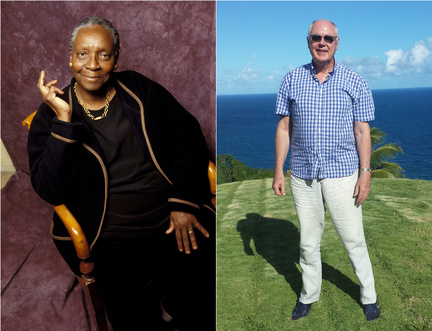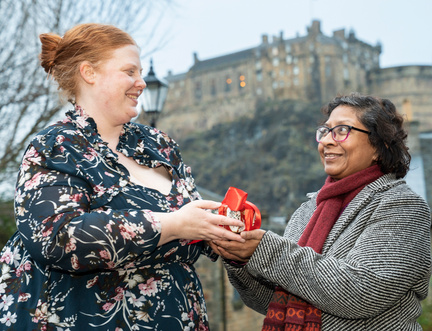More articles Tuesday 25 August 2020 3:45pm
Maryse Condé: "You have given yourself the right to laugh and to enjoy laughing"

Maryse Condé was joined by her husband and translator, Richard Philcox, in conversation with Maya Jaggi at the Edinburgh International Book Festival Online today to discuss her recent novel, The Wondrous and Tragic Life of Ivan and Ivana, which was first published in French in 2017 and subsequently translated into English by Philcox. Condé was born in 1937 in Guadeloupe in the French West Indies, and is the author of epic historical fiction, much of it set in Africa.
Condé received the 2018 New Academy Prize for literature in Stockholm, the award set up to replace the Nobel Prize, and her novels include Ségou, an epic about a West African Kingdom, doubly besieged by Islam in Europe, which won the African literature prize among other awards; I: Tituba, the true story of a West Indian Obeah woman caught up in the Salem witch trials in Puritan New England; and Windward Heights which transposes Emily Brontë's Wuthering Heights to Guadalupe.
Speaking from their home in the South of France, Condé talked about using lockdown to devote her time to writing a new novel, which she said would be her last. She went on to talk about Tragic Life of Ivan and Ivana, saying she wanted to write a novel set in the present, with young people as protagonists adding “Because when you are an old writer like me, you tend to be obsessed by your past. An example being À la Recherche du Temps Perdu? de Marcel Proust.” Having written books about her early childhood in Guadaloupe, then her life in Africa and her travels with her husband, this was an entirely different venture into modern times. “Ivan and Ivana are young. So it was an effort for me, an old person, to forget about my childhood, my education, my parents, and to write about all the difficulties of the world as we see it now.”
Condé also spoke about how her generation differed from the younger generation, particularly the young black people born in France. Condé said “You see, where I'm different from the people of younger generation, black people born in France. Because their parents were migrants forced to leave Africa they tend to have a different approach to colonialism. My generation was very harsh against colonialism. For us it was only evil, bad things forced upon us. But now, with the younger generation, there is the pursuit of violence. They try to see what was wrong with colonialism and what was good.” Philcox explained that she has difficulty understanding the idea that young people from African and the Caribbean who are born in Europe think they are English or French and that they have no other place to go. “And the fact that she went to Africa, she couldn't stay in France because the French would never really accept her as a French citizen. So her idea of colonialism and migration is very different from the younger generation today, who are striving to be accepted as British citizens or French citizens or Dutch citizens, and this is a very complex issue for Maryse.”
Condé also talked about the musical references throughout the novel, and how important music was to her as a writer. “For me, I can tell you that whenever I write, I used to have music. For me, writing and music are close, are mixed up. You cannot write unless you understand, unless you hear, unless you love music. Music is a way of dreaming. You have a way of touching reality but in your own way through songs in your head. So for me it is difficult to make a difference between writing and listening to music, between writing and being a musician.”
She also stressed the importance of humour. “First, a writer only writes for herself. When you are a writer, you don't think of everybody else. You are the only person who understands what matters. So, the jokes are only for yourself. You laugh, you smile, nobody understands. OK, just tough luck, but you are the one who laughs and you have given yourself the right to laugh and to enjoy laughing.”
You can listen to this event in full on our website: https://www.edbookfest.co.uk/the-festival/whats-on/maryse-conde-richard-philcox-giving-voice-to-guadeloupe/player
- 2025 Festival:
- 9-24 August
Latest News
 Communities Programme participants celebrate success of 2024
Communities Programme participants celebrate success of 2024



